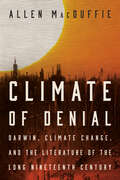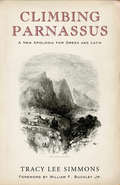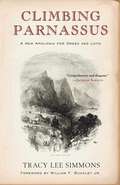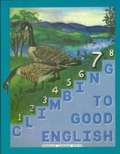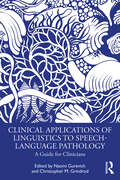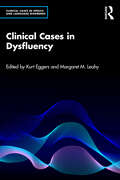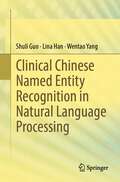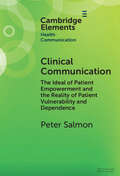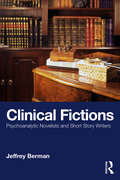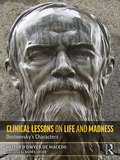- Table View
- List View
Climate of Denial: Darwin, Climate Change, and the Literature of the Long Nineteenth Century
by Allen MacDuffieMany people today experience the climate crisis with a divided state of mind: aware of the extreme effects, but living everyday life as if the crisis is not actually happening. This book argues that this structure of feeling has roots that can be traced back to the nineteenth century, when Western culture encountered the profound shock of Charles Darwin's theory of evolution. Darwin's theory made it increasingly difficult for secular humanists to flatly deny that humans are animals, fully enmeshed in natural systems and processes. But like those of us confronting climate change today, many writers and scientists struggled to integrate its depersonalizing vision into their understanding of the place of humans in the natural order. The result was that the radical environmental implications of The Origin of Species were evaded as soon as they were articulated, abetted by a culture of denial structured by the illusions of capital and empire. In light of the climate emergency, Climate of Denial recontextualizes nineteenth-century texts to offer rich insight into the defensive strategies used—then and now—to avoid confronting the unsettling realities of our situation on this planet.
Climbing Parnassus: A New Apologia for Greek and Latin
by Tracy Lee SimmonsClimbing Parnassus presents the reader not so much with a program for educational renewal as with a defense and vindication of the formative power of Greek and Latin. Tracy Lee Simmons's persuasive witness to the unique, now all-but-forgotten advantages of study in, and of, the classical languages constitutes a bracing reminder of the genuine aims of a truly liberal education.
Climbing Parnassus: A New Apologia for Greek and Latin
by Tracy Lee SimmonsIn Climbing Parnassus, winner of the 2005 Paideia Prize, Tracy Lee Simmons presents a defense and vindication of the formative power of Greek and Latin. He also shows how these languages have played a crucial role in the development of authentic Humanism, the foundation of the West's cultural order and America's understanding of itself as a union of citizens. Simmons's persuasive witness to the unique, now all-but-forgotten advantages of study in and of the classical languages constitutes a bracing reminder of the genuine aims of a truly liberal education.
Climbing To Good English 2
by SchoolaidClimbing To Good English Grade 2: An Extension in Phonics, Reading Comprehension, Grammar, Dictionary Skills, and Composition.
Climbing to Good English (Grade #1)
by SchoolaidEnglish in first grade is more or less an extension of reading and phonics. Phonics helps pupils to read; English helps them to write what they or others will read. In teaching pupils to express themselves in writing, English uses the concepts taught in phonics while adding some of its own.
Climbing to Good English (Grade #2)
by SchoolaidA grammar textbook that will help pupils to study and learn how to read and write effectively.
Climbing to Good English 3
by SchoolaideCLIMBING TO GOOD ENGLISH 3 is first of all a review and reinforcement of the language skills, grammar, and phonics taught in CLIMBING TO GOOD ENGLISH 2. After the initial, and general, review in Unit I, we continue to repeat old concepts for the purpose of reinforcement and as a base on which to build extensions and new concepts
Climbing to Good English Grade 2 Practice Sheets (Climbing to Good English)
by SchoolaidClimbing to Good English Grade 2 Practice Sheets
Climbing to Good English Practice Sheet: Grade 7
by Martyrs MirrorClimbing to Good English gr.7 Practice Sheet
Climbing to Good English Practice Sheet: Grade 8
by SchoolaidClimbing to Good English gr.8 Practice Sheet
Climbing to Good English Practice Sheets (Grade #6)
by SchoolaidPractice sheets for Grades 5-6 Climbing to Good English. This Schoolaid Language Series is designed by Schoolaid to complement the Pathway Reader Series by extending in phonics and reading comprehension, grammar and composition.
Climbing to Good English: Grade 4 Practice Sheets
by SchoolaidThis Schoolaid Language Series is designed by Schoolaid to complement the Pathway Reader Series by extending in phonics and reading comprehension, grammar and composition.
Climbing to Good English: Grade 6
by Rod Staff<p>Our main goal, of course, is to improve our communication skills -- to understand what we hear or read and to express ourselves clearly in speaking and writing. However, to attain these skills, we need the building blocks of grammar, mechanics, and usage. For these reasons we have begun each unit with a composition lesson in which pupils are exercised in listening, reading, evaluation, taking notes, organizing, building vocabulary, explaining, writing, editing, and rewriting. <p>Between the composition assignments, pupils are drilled on how to handle the building blocks of grammar (sentence structure, parts of speech, etc.), mechanics (punctuation and capitalization), and usage (word study). Our language series, Climbing to Good English (CGE), is different from most others on the market in that it is programmed for use in multi-grade classrooms. This means that the pupils are expected to help themselves -- do much of the work independently without much teacher help. The older a pupil becomes, the more he is expected to do this.</p>
Clinical Applications of Linguistics to Speech-Language Pathology: A Guide for Clinicians
by Naomi Gurevich Christopher M. GrindrodClinical Applications of Linguistics to Speech-Language Pathology is a practical guide that provides linguistically grounded approaches to clinical practice. It introduces key linguistic disciplines and discusses how they form a basis for assessment and treatment of individuals with communication differences or disorders. Written by experts in linguistics and communication disorders, each chapter provides clinicians with a foundational understanding of linguistics as it applies to spoken and signed languages and underscores the importance of integrating linguistic theories into clinical decision-making. The book is divided into two parts that focus on the applications of linguistics to speech and language differences and disorders in both children and adults. The chapters cover the full range of linguistic domains including phonetics, phonology, morphology, syntax, semantics, pragmatics, and sociolinguistics. Applications to a wide range of populations including childhood apraxia of speech, aphasia, dysarthria, traumatic brain injury and accent modification clients are also discussed. Many chapters include assessment and treatment resources that can be used by practicing clinicians. This highly accessible and comprehensive book is an indispensable resource for practicing speech-language pathologists and other members of the profession, including instructors with minimal exposure to linguistics. It will also be beneficial for students of Linguistics, Speech and Hearing Sciences, and Audiology and Speech Language Pathology who are seeking practical knowledge of the fields.
Clinical Cases in Dysfluency (Clinical Cases in Speech and Language Disorders)
by Kurt Eggers Margaret M. LeahyClinical Cases in Dysfluency is an imperative work that introduces dysfluency in clinical and cultural contexts while encouraging reflection on clinical decision-making involving the assessment and management of clients. With inputs from eminent clinical researchers across the world, this text brings together diverse voices and expertise to provide readers with innovative ideas for their own practice. The book assists in refining clinical problem solving and valuing exchanges between clients and clinicians. Featuring real-life case studies covering stuttering and cluttering in children and adults, it showcases the importance of evidence-based practice and practitioner reflection, demonstrating a range of approaches to address problems experienced with dysfluency, and their management. The authors go on to discuss issues of stereotyping, resilience, and therapeutic commonalities in general, and in multicultural contexts, whilst also introducing the discipline of Dysfluency Studies, where stuttering is considered positively in its complexity and not as a disorder. These concepts are effectively further illustrated through accompanying online resources including videos, and weblinks. This is an indispensable resource for students and clinicians in the domains of Fluency, Speech and Language Pathology and Communication Disorders, and will be valuable reading to anyone interested in communication disorders, dysfluencies, and application of theory to practice in these disciplines.
Clinical Chinese Named Entity Recognition in Natural Language Processing
by Shuli Guo Lina Han Wentao YangThis book introduces how to enhance the context capture ability of the model, improve the position information perception ability of the pretrained models, and identify and denoise the unlabeled entities. The Chinese medical named entity recognition is an important branch of the intelligent medicine, which is beneficial to mine the information hidden in medical texts and provide the medical entity information for clinical medical decision-making and medical classification. Researchers, engineers and post-graduate students in the fields of medicine management and software engineering.
Clinical Communication: The Ideal of Patient Empowerment and the Reality of Patient Vulnerability and Dependence (Elements in Health Communication)
by Peter SalmonGood communication is necessary for good clinical care, but defining good communication has been surprisingly difficult and controversial. Many current ideas that identify good communication with certain communication behaviours, or 'skills', were ethically inspired to help doctors see beyond disease to the whole patient. However, promoting specific behaviours is problematic because communication is contextually dependent. In recent decades, observational research into practitioner-patient relationships has begun to provide a scientific basis for the field, identifying patients' vulnerability and practitioners' authority as defining features of fundamentally asymmetric clinical relationships. Future educators can learn from research that explores the judgments that experienced practitioners make when they manage communication dilemmas arising from this asymmetry. In future, instead of the current emphasis on teaching communication behaviours, educators could provide practitioners with knowledge about relationships to inform those judgments, while addressing the attitudes and values that motivate and guide their communication.
Clinical Fictions: Psychoanalytic Novelists and Short Story Writers
by Jeffrey BermanClinical Fictions: Psychoanalytic Novelists and Short Story Writers is the first book to explore works of fiction written by prominent psychoanalysts.Broken down into thematic sections, the book traces the literary output of pioneering psychoanalysts such as Julia Kristeva, Bruce Fink, Thomas Odgen, and Gregorio Kohon, among others. Berman looks at works of historical fiction, detective fiction, and the short story, and shows how recurring themes typical of these genres can be understood both psychoanalytically and through a literary lens. The works included investigate experiences of childhood adversity, life in dystopian societies, experiences of psychosis, bodily autonomy, personal loss and, above all, trauma. Unpacking these themes, and their depiction through fiction, Berman gives the reader the tools to apply psychoanalytic literary theory to further works. Interweaving his personal correspondence with authors, including a heartwarming exchange with Cliff Wilkerson, Berman offers unparalleled access to the inner workings of the writers’ minds.This book will be of interest to students and researchers using psychoanalytic literary theory, as well as mental health practitioners who are interested in the intersections between literature and psychoanalysis and discovering new ways of probing the unspoken and unconscious.
Clinical Lessons on Life and Madness: Dostoevsky's Characters
by Heitor O’Dwyer de MacedoThe author of Clinical Lessons on Life and Madness: Dostoevsky’s Characters draws on Dostoevsky's universe to illuminate psychoanalytic theory and practice. Using Dostoevsky’s characters as case studies, the author discusses the various psychoanalytic concepts they embody, and shows how these insights can be applied to therapeutic understanding. By considering the people who populate Dostoevsky’s world as personifying a whole spectrum of human possibilities and modes of relation, Heitor O'Dwyer de Macedo’s discussion of the characters – including those from Notes from Underground, Crime and Punishment and The Brothers Karamazov – allows him to explore fundamental issues constitutive of clinical practice, such as trauma, fantasy, perversion and madness. Clinical Lessons on Life and Madness will provide an important resource for psychoanalysts with an interest in literature, as well as students of literature seeking a psychoanalytic interpretation.
